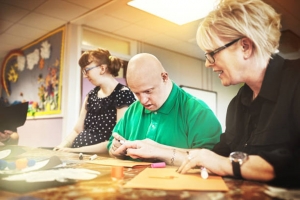For the first time, the adult social care sector has united to develop a workforce strategy for adult social care in England. Spearheaded by Skills for Care, this strategy outlines immediate and long-term actions to address workforce challenges.
At a launch event on July 18th, co-Chairs Oonagh Smyth, CEO of Skills for Care, and Sir David Pearson, Director of Adult Social Care in Nottinghamshire, presented the strategy's key points and future steps. The recommendations focus on three areas: attracting and retaining staff, improving training and career development, and transforming the care landscape. To attract and retain social care staff, the strategy emphasises better pay and working conditions. Economic analysts modelled various pay increase scenarios, suggesting even modest pay increases could significantly boost recruitment and retention.
The strategy also calls for a 10-year attraction plan focusing on younger people and men, who are underrepresented in the sector. Improving training and career development is another crucial aspect. The strategy advocates for a three-year funding commitment to provide social workers with new skills, particularly in dementia care. It also aims to revive apprenticeships and invest in training for occupational therapists and nurses.
The final recommendation is to ensure these plans are implemented. Skills for Care suggests publishing a report every five years to assess workforce needs and establish a central body to oversee the strategy's execution.
New Education Secretary Bridget Phillipson has pledged to prioritise education and support for children with special educational needs and disabilities (SEND). The Labour government plans to recruit 6,500 new teachers to enhance life opportunities for children.
Phillipson aims to reform the SEND system, promising more support for children with special needs and their families. The Department for Education (DfE) will restructure, placing SEND and Alternative Provision under the Schools Group, which should improve inclusion in mainstream schools. Recognising the significant challenges in the education sector, including child poverty, financial pressures, high workloads, and strained care services, Phillipson has committed to expanding early years education, raising standards, and reforming the curriculum and assessment.
Immediate plans include recruiting new teachers, developing a comprehensive post-16 education strategy, collaborating with local governments to support children in care, and creating better training and employment pathways by empowering communities.
Advocacy organisations support Phillipson’s commitments but urge greater involvement in policy changes. The co-directors of Special Needs Jungle emphasised the need to prioritise SEND, improve accountability, ensure early intervention, protect legal education rights, secure funding, and value the voices of parents and children. They also called for a national recruitment drive and re-evaluation of the SEND Change Programme.
New Prime Minister, Sir Keir Starmer, has pledged to revamp mental health services with significant resource allocation and reforms now that he has won the general election. Alongside Labour’s newest member, Dr. Dan Poulter MP, Starmer emphasised a commitment to mental health improvement.
Dr. Poulter, a psychiatrist and former Conservative health minister, defected from the Tory Party, criticising its handling of the NHS under Rishi Sunak. He stated the health service was no longer a priority for the Conservatives, leading to frontline strain and declining patient care. Poulter believes only a Labour government can rectify these issues and has vowed to support Starmer and shadow health secretary Wes Streeting on NHS policy.
Starmer celebrated Dr. Poulter's defection, calling it a significant boost for Labour's NHS plans. He cited NHS data showing over 120,000 children faced waiting times exceeding six months for mental health support in 2022-23, branding these delays a societal disgrace.
Labour’s strategy includes reforming the Mental Health Act, hiring 8,500 specialised mental health staff, and providing mental health support in schools and communities, funded by closing tax loopholes.
Keir Starmer proclaimed the "sunlight of hope" is shining again in Britain following Labour's resounding election win, ending 14 years of Conservative rule. Starmer is set to become prime minister after Rishi Sunak conceded, with Labour expected to secure over 410 seats compared to the Conservatives' 115.
Starmer, speaking at Royal Festival Hall in London, expressed relief and optimism, emphasizing a renewed opportunity for the country. The Conservatives faced their worst election performance, with key figures like Liz Truss, Jacob Rees-Mogg, and Grant Shapps losing their seats. Labour also made significant gains in Scotland and from the SNP, while the Liberal Democrats increased their seats to 70.
Reform UK saw a rise, winning at least four seats, with Nigel Farage becoming an MP. The Greens also won four seats. Notably, former Labour leader Jeremy Corbyn won in Islington North as an independent, and pro-Palestine independents had surprising victories.
Sunak acknowledged the defeat, emphasising the peaceful transfer of power. Labour's triumph is seen as a beacon of hope for progressive movements globally. The party reclaimed significant regions from the Conservatives, marking a major turnaround since Starmer took leadership. Labour is poised to implement substantial changes, with a focus on workers' rights, energy generation, and improved trading relations, while addressing critical issues like the NHS and prison system.
Students at St Michael's Church of England High School in Rowley Regis, West Midlands, are walking more than 40 laps of their school field to raise awareness for the need of increased mental health support in schools nationwide. The school also aims to raise £12,000 to launch its own mental health early intervention hub.
Around 20 students will walk a total of 208km (129 miles), symbolising the distance from their school to parliament, while the rest of the school will complete four laps of the field. A student of St Michael's Church of England High School has expressed excitement about the "unusual" challenge and the opportunity to raise funds for the hub.
Kerry Whitehouse, the school's senior mental health lead, emphasised the importance of the hub, citing that mental health services are currently overwhelmed. She referenced an NHS survey from last year indicating that one in five children and young people in England have a probable mental health disorder. "Young people are reaching crisis point before they can get that support," Whitehouse noted.
The school runs several initiatives to support students' mental health, including the Matrix Project, which facilitates discussions among boys aged 11 to 14 about mental health issues. Students as a collective have all highlighted the benefits of these projects, stating they help normalise conversations about mental health.












